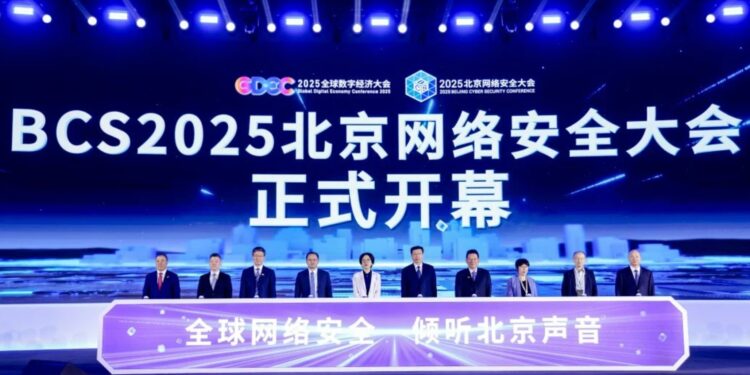The 2025 Beijing Cyber Security Conference (BSC 2025), an important platform for global top leaders to discuss the increasingly severe challenges and unprecedented opportunities brought by the Artificial Intelligence (AI) era to cyber security and other related areas, was held recently.
Themed by appealing principle “Security Breakthrough: Built-in Security Shaping,” the conference attracted national defense department leaders, industry tycoons, academy scholars, and science community leaders in the field globally.
One of the key themes that kept surfacing in the talks was the critical nature of game-changing developments in cybersecurity in an era where intelligent agents and vertical AI applications are becoming the norm.
Qi Xiangdong, Vice Chairman of the All-China Federation of Industry and Commerce and Chairman of Qi-Anxin Group, says that the current means of protecting data are inadequate in the face of artificial intelligence-based attacks. He put forward three fundamental means to rebuild the framework for the security industry — data aggregation model, security operation model and ecosystem collaboration model.
Yet the conference also made clear that more advanced AI does not necessarily lead to increased security. AI security threats are becoming increasingly complex, from simple vulnerability to composite and sophisticated attack, according to Zeng Yi, Dean of the Beijing Institute of AI Safety and Governance.
Zhao Zhiguo, Executive Deputy Director, Expert Advisory Committee, Internet Society of China, echoed this statement, and emphasized AI as a key technological field in global cybersecurity competition and vital asset in capturing the initiative in cyberspace. He called for a methodical effort to address complex threats and create a more nimble, intelligent, and cooperative security dynamic.
Recurring was the need of an ecosystem based on cooperation and shared prosperity. This co-creation mode of the project is considered as being indispensable to work together on major technology challenges, to foster industrial synergy and together develop a strong cybersecurity ecosystem.
The program of the conference offered a wide variety, from modern technology platforms, specialized contests to international cooperation sessions. It was also the first time a satellite of the fair was set up in Macao S.A.R. this year. More than a dozen sub-forums discussed specialized areas, such as the security of smart energy, data, and AI large models in security fields to feature the wide application of AI in various fields.
The Beijing National Cybersecurity Industrial Park was also singled out as a major project with substantial progress made in its construction, and the national-level public cybersecurity service platform put into operation.
As the center for international scientific and technological innovation, Beijing, will work to make progress in great original technological break-through, improve the ability to apply the digital security, speed up the construction of the standard system and enhance digital application of information security, and build a solid security foundation for security in digital economy.










![Online Scam Cases Continue to Rise Despite Crackdowns on Foreign Fraud Networks [Myanmar] Online Scam Cases Continue to Rise Despite Crackdowns on Foreign Fraud Networks [Myanmar]](https://sumtrix.com/wp-content/uploads/2025/06/30-12-120x86.jpg)





